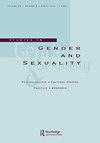The “Ethical Turn” in Psychoanalysis: A Skeptical View
Q3 Social Sciences
引用次数: 0
Abstract
ABSTRACT In the last decade there has been a great outburst of ethics upon the psychoanalytic scene, with the appearance of several books and many scholarly articles making a claim for a central role for ethics in our theorizing and practice. One might ask, Why now? In attempting to answer this question, the author considers the position of psychoanalytic therapists as “implicated subjects” (from Rothberg) within the neoliberal political economy, aware of our passive participation in causing widespread harm. Discomfort with this awareness has provoked strenuous assertions of our goodness, which are undercut, however, by some serious ethical lapses. These include our investment as private practitioners in a manner of service delivery that has contributed to a crisis of public access to mental health care; the lack of accountability for harm caused to LGBTQ people by decades of homophobic theorizing and practice; and the concentration of power in our professional organizations.精神分析中的“伦理转向”:一个怀疑的观点
在过去的十年里,在精神分析领域出现了伦理学的大爆发,出现了几本书和许多学术文章,声称伦理学在我们的理论和实践中发挥了核心作用。有人可能会问,为什么是现在?在试图回答这个问题时,作者考虑了精神分析治疗师作为新自由主义政治经济学中的“牵连主体”(来自Rothberg)的地位,意识到我们被动地参与了造成广泛伤害的过程。对这种意识的不安激起了对我们善良的强烈断言,然而,由于一些严重的道德失误,这种断言被削弱了。其中包括我们作为私人医生的投资,以一种提供服务的方式,造成了公众获得精神保健的危机;数十年来的恐同理论和实践对LGBTQ群体造成的伤害缺乏问责;权力集中在我们的专业组织。
本文章由计算机程序翻译,如有差异,请以英文原文为准。
求助全文
约1分钟内获得全文
求助全文
来源期刊

Studies in Gender and Sexuality
Social Sciences-Gender Studies
CiteScore
0.80
自引率
0.00%
发文量
15
期刊介绍:
Beginning in the final two decades of the 20th century, the study of gender and sexuality has been revived from a variety of directions: the traditions of feminist scholarship, postclassical and postmodern psychoanalytic theory, developmental research, and cultural studies have all contributed to renewed fascination with those powerfully formative aspects of subjectivity that fall within the rubric of "gender" and "sexuality." Clinicians, for their part, have returned to gender and sexuality with heightened sensitivity to the role of these constructs in the treatment situation, including the richly variegated ways in which assumptions about gender and sexuality enter into our understandings of "normality" and "pathology."
 求助内容:
求助内容: 应助结果提醒方式:
应助结果提醒方式:


